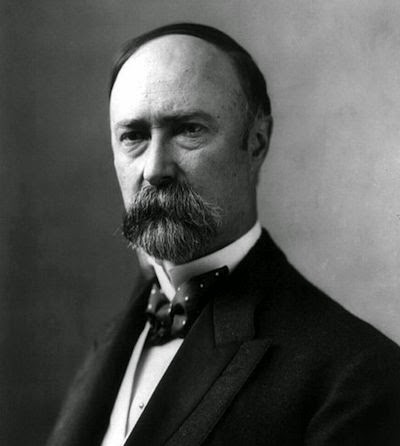 |
| Charles W. Fairbanks Probably didn't speak Esperanto |
But given the openly partisan newspapers of the day, you would think the one published by members of his own party might have cut him some slack. No dice. Both the Salt Lake Herald and the Salt Lake Tribune were published by Republicans, but in 1907, Fairbanks clearly wasn’t the Republican they liked. (The Tribune describes the Herald as a “Democratic newspaper.”)
At the time, Fairbanks was hoping for the Republican nomination for President for the 1908 election, but he never got the full backing of his party.[2] But I think it was the cocktails that really counted against him in Utah. Oddly enough, both papers in slamming Mr. Fairbanks brought up Esperanto.
They’re both brief items, crammed amongst other items. Let’s start with the Salt Lake Herald of November 14, 1908:
The desperation of Vice President Fairbanks is evidence by the fact that he has taken up the study of Esperanto. Apparently no vote is too trifling for him to go out after.At first I took this at face value. Could the Vice President have been studying Esperanto? It would have given him something to do. Time probably hung heavy on his hands during his days at Teddy Roosevelt’s VP. He was certainly aware of Esperanto, as I found reference to a presentation made to the President and Vice President on the utility of Esperanto, although that came somewhat later, in 1908. Amerika Esperantisto, in a May 1908 article[3] on Edmond Privat, reported
En Marto li faris naŭ paroladojn en Washington, vizitis Prezidanton Roosevelt kaj Vice-Prezidanton Fairbanks, kaj klarigis al ili kion celas Esperanto.
In March he gave nine talks in Washington, visited President Roosevelt and and Vice-President Fairbanks, and clarified to them what the goals of Esperanto were. (My translation)I have found no indication that Charles Fairbanks knew Esperanto. There an entry in Wikibooks that states that Theodore Roosevelt spoke Esperanto, but no support is given for that assertion.[4]
On November 23, 1907, the Salt Lake Tribune chimed in with the assertion that Fairbanks was studying Esperanto, again, they were trying to score political points.
Vice-President Fairbanks is studying Esperanto; probably for the purpose of passing a few remarks concerning the cocktail incident which would not sound well in English.The cocktail incident? That took no digging. In 1907, Fairbanks hosted a lunch at his home which started off with cocktails! Booze! And from a man who claimed to be a teetotaler.[5] The Prohibition Party was not happy.[6] Fairbanks tried for the Presidential nomination, but lost. He ran one more time as a Vice-Presidential candidate, but his political career was over. No word if he consoled himself with the study of Esperanto, in the manner of the Duchess of Marlborough.
While these two brief items were bad news for Fairbanks, they also show that Salt Lake City newspapers were treating Esperanto with a bit of mockery. It’s something to learn if you’re desperate for votes, or trying to quash a political scandal, lest your statements in English sound stupid. And yet the Herald had been so positive about Esperanto in 1906.
- We are, after all, talking about someone who famously started a speech by pointing out that he had been shot, and then talked for 90 minutes before seeking medical attention. ↩
- Wikipedia notes that Roosevelt supported William Howard Taft. ↩
- The article is by “Doktorino Clara Todson.” Unlike Ivy Kellerman Reed (who seems to have preferred “Doktoro”), Todson was a physician, specifically an osteopath. (Reed was a linguist.) In 1908, she was also treasurer of the Woman’s Esperanto League of North America, and president of both the Illinois Esperanto Association and the Elgin Esperanto Society. In 1908, Illinois was home to nine Esperanto organizations. She was born in 1868, and died in 1925, less than a month after her 56th birthday. ↩
- Although Roosevelt was a proponent of simplified spelling, for which the press mocked him. ↩
- Because he was. ↩
- To be clear: Fairbanks was not a member of the Prohibition Party, however the party was gaining power. Prohibition was in the near future. Wikipedia notes that that the 1908 Prohibition Party Presidential candidate was Eugene Chafin. ↩
No comments:
Post a Comment